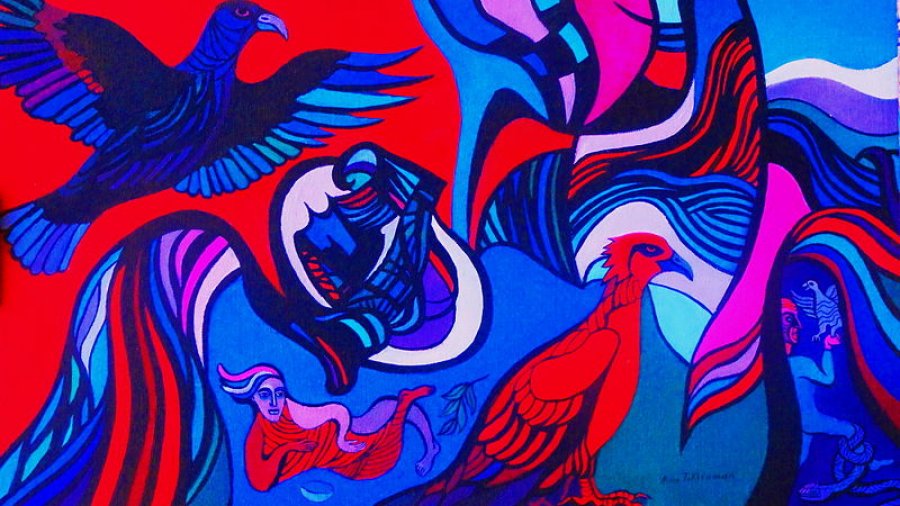I arrive in the dimly lit entryway of Daejeo-Jungang Elementary School and immediately remove my dress shoes, trading them for a pair of slide sandals, my indoor footwear. I take a small step upwards from the entryway onto the old, stained wood panel floor that flows throughout the school. As I do this, I unconsciously detect the familiar interior scent—aged, dusty, somewhat stale, reminds me of an antique store or museum.
I mosey a few paces through a wooden sliding door into the main teachers’ office. The vice principal and sixth grade teacher are seated at their computers. I greet them with an obligatory bow and quasi-cheerful “annyeonghaseyo!” (It’s Monday; I’m drowsy). I then grab my classroom’s key and security card from the top shelf of a large cabinet and exit the room.
I walk down the long, wide main hallway—a hallway which spans lengthwise east to west, from front to rear entrance, perfectly bisecting the school. Carbon copies of this corridor split the second and third floors as well, so that each floor mirrors the others. The hallway is illumined only by daylight which skis in through a greenhouse-like south aperture and myriad windows. Resting on the floor near the south entryway and on several window sills are an array of potted plants and a few specimens of pottery.
The walls bear generous but not extravagant decoration: the name of the school in large gold-ish Hangul (Korean alphabet) lettering; a case containing miniatures of dozens of Korean masks; framed and unframed banners displaying hand-written old-style Hangul script; a pair of highly detailed physiological and geological posters; a couple large, official-seeming plastic installations with pictures of ostensibly happy and productive past students; a massive, bright painting of some animals; a sprinkling of homemade English posters.
I move briskly down this corridor, pass the principal’s office (into which I once peered to discover the principal napping face-down on his desk), bathrooms, the nurse’s office, and the “guard room” (where the school’s elderly security guard sleeps; difficult to say what else he does in devoid-of-crime Korea). A few students have arrived and chatter incomprehensibly ahead of me. I try to perk my face up so as not to look frazzled and shout “good morning!”. A couple of them return the greeting and one girl sticks her tongue out at me. I veer slightly right at the corridor’s end and dart up two flights of stairs, finally reaching the third-floor English room.
I unlock and remove the padlock, slide open the wooden door, and disengage the alarm system. The museum-aroma is stronger in my stuffy classroom. I turn on my Samsung desktop PC, open a couple windows (the school does not turn on the AC despite perspiration-inducing classroom heat), then leave to fetch some coffee—Korean instant coffee, that is: 10% coffee, 90% sugar.
I will co-teach five English classes today with my Korean counterpart, Ms. Sung. Rarely will either of us address the class without multiple students chit-chatting, throwing things, out of their seats, poking, hitting, kicking each other, and/or otherwise behaving in ways considered utterly unacceptable by my previous self. But I’m used to the SNAFU by now. It’s no longer nerve-wracking or intimidating; it just is.

Bird Phoenix by Nina Petrovna Valetova, 2011. Photo Credit: Wiki Commons
Normalize in 3, 2, 1 . . .
The above passages describe approx. five minutes of my typical workday. Five minutes, and yet I’m sure a dozen or so details leapt out at you—details that revealed foreignness, stark differences between my school and your idea of a school. Maybe they intrigued you, irritated you, or just seemed . . . strange.
When I first arrived in Korea—new to Asia and having never taught in a classroom setting—I was bombarded by such details. I had departed from the land of the familiar, sat on a jet for 15 hours, and arrived in a place I knew only through Google Images and Wikipedia. In the first days and weeks, galaxies of new and often discombobulating information and stimuli materialized for me to prod and gawk at and (slowly) digest.
The first month was marvelous, weird, challenging, and a whole lot of other adjectives. A couple months later, things were not-as-marvelous, still weird, more challenging (in new ways), and sometimes depressing. A couple more months, and things were only moderately weird, moderately challenging (mostly in expected ways), and no longer depressing.
After nine months and change, here’s what Korea feels like most days: damn ordinary. So many things that once jostled and/or jarred me about living here—lack of spatial courtesy, absurd beauty/fashion standards, kimchi and rice with every meal, smart phone addiction, frequent bowing and other polite gestures, odd school procedures, going days without seeing another Westerner, etc. etc.—have become commonplace.
Busan, South Korea has become my normal, and it took about 6-7 months (for me at least; see: stages of culture shock). That’s not to say that Korea-things never surprise or captivate me now, but I have to pay closer attention. And even the “surprising” things nowadays somehow seem “so Korean”—easily placed within my now-elaborate mental blueprint of “how things are here”.
When imagining life in a foreign country, it’s easy to envision a sort of perpetual interesting-fest, a wonderland of sorts where things will ever remain kaleidoscopic so long as one is thousands of miles from home. In practice, this hypothesis fails.
The human mind has a tremendous capacity for adaptation, and when given sufficient time in even the most foreign environments, it will derive patterns from what was first chaotic, will assemble haphazard data points into manageable diagrams. This makes sense, after all: for most of human history, we were primarily nomadic hunter-gatherers—a species whose greatest asset was its ability to intelligently adapt to changing surroundings. We’re good at getting used to shit, and this is often a great thing.
Dat Novelty
The flip-side is that humans often come alive, learn, and expand through exposure to new experiences. As our minds constantly create new comfort zones, novelty becomes increasingly scarce. Travel is a foolproof way to encounter the new, but a setting-shift alone is simply not a sustainable means of avoiding existential stagnation. Even abroad, life simply dulls if we do not deliberately seek out avenues of novelty and meaning-making.
Fortunately, place-independent avenues—relationships, art-exploration, service, making things, looking closely, academic study (or autodidacticism), appreciating nature, exercise, weird projects, meditation, doing something, etc. etc.—are always available to us. South Korea is inevitably a lot less colorful than it was at first, but this human existence thing still feels pretty rich and supple (most days) because I never ceased to engage that which is exciting regardless of where I reside: people, literature, writing, music, nature, etc. etc.
Not Kansas Anymore, a Home in Oz
Furthermore, the normalization of my Korean environment is not without its benefits. I’m a lot more relaxed and confident navigating the culture these days, which feels good. I know that I am capable of meeting the demands of life here, and there is a distinct comfort in that certainty.
This comfort I feel is accompanied by a peculiar sort of experiential knowledge: the knowledge of having created something like a home out of near-nothingness; of having plummeted into a foreign and seemingly risky Oz and rendered it unimposing and meaningful; of having established a new life in a new place.
Everyone and everything that has affected me in Korea—dear friends, a great girl, favorite bars and restaurants, books, impish students, bizarre rap exploits, the perplexing intricacies of a foreign culture, the intangible perspective-expansion that comes with all travel—did not exist in my world ten months ago.
It’s a bit of a trip to consider that truth and to feel the substantial breadth and meaning that those things have added to my universe. I cannot imagine my life without all that has fused with it these past nine and a half months. Though there were certainly difficult times, what has been gained (a new world) seems clearly to outweigh all downsides.
Evolve Like Pokémon
Moreover, having managed to live “somewhere over the rainbow”, I feel a heightened sense of general self-assurance, a feeling of being more well-equipped for whatever comes next. It seems that any substantial trek into the unknown (which might be a worthy definition for life itself) manages to backhand test us and stretch us—something more is always demanded, whether it be willpower, intelligence, equanimity, or self-awareness.
What we lack is first the source of tribulation, but when that necessary aspect is found and the challenge is met, strength and self-confidence are gained. Power increases, the proverbial Pokémon of the self evolves (forgive me for that metaphor). It must, after all, because the cycle will continue, and we will be curb stomped again, forced to rejuvenate once more. The poet Rilke probably spoke of this cycle when he wrote that, “The purpose of life is to be defeated by greater and greater things.”
I Can Has Knowledge?
Living abroad has also, I daresay, given me a bit more understanding, self-knowledge, perspective. The unfamiliar invariably causes one to see and reflect in new ways. I feel humbled by the size of the world and by my position in it—a position at once diminutive and filled with significant possibility. I also have a greater awareness of what I love and what moves me (though those things are prone to change).
When wrenched from the familiar, stripped of all connections, and plopped into a new environment, all pressures to be who one once was are suddenly absent. The slate is clean, and one has space to really consider how to spend one’s time. In this situation, the excess seems naturally to fall away, like a gaudy snakeskin, revealing what is most important and joyful for the individual.
This can actually be terrifying because one might not be who one thought one was or one might feel irresistibly compelled to do things that seem petrifying. Yet in this situation there seems to be little to do but to embrace what is found. Accepting whatever I find, both within and without, is something I’ve continued to learn and re-learn in South Korea. Friedrich Nietzsche wrote of a related and relevant idea, amor fati (“love of one’s fate”), which Joseph Campbell describes beautifully in his book, Reflections on The Art of Living:
“Nietzsche was the one who did the job for me. At a certain moment in his life, the idea came to him of what he called ‘the love of your fate.’ Whatever your fate is, whatever the hell happens, you say, ‘This is what I need.’ It may look like a wreck, but go at it as though it were an opportunity, a challenge. If you bring love to that moment—not discouragement—you will find the strength is there. Any disaster that you can survive is an improvement in your character, your stature, and your life. What a privilege! This is when the spontaneity of your own nature will have a chance to flow.
Then, when looking back at your life, you will see that the moments which seemed to be great failures followed by wreckage were the incidents that shaped the life you have now. You’ll see that this is really true. Nothing can happen to you that is not positive. Even though it looks and feels at the moment like a negative crisis, it is not. The crisis throws you back, and when you are required to exhibit strength, it comes.”
It’s this sort of attitude (with perhaps a more restrained optimism and a dash of black humor) that I continue to try to develop and retain as I meet the unexpected. Through encountering many unforeseen hiccups (and a couple borderline crises) in a foreign country, the importance of an open, non-resistant, and quick-to-chuckle temperament has become increasingly clear. I would go as far as to say that for me, failure to cultivate such an attitude would make it almost unbearable to live on this planet.
End Feels
My teaching contract in Korea expires in August, and as the end looms near, I feel a sense of rootlessness, an uncertainty about what it will feel like to go “home”. I’m told that it’s difficult to see all of the ways one has changed while abroad, but that upon returning home all sorts of things become clear, sometimes painfully so. Things will be different, I’m sure, and I’ll soon enter a sort of limbo in which Korea has vanished and I await whatever self or whatever home replaces it.
The knowledge of my impending departure lends an intermittent ephemerality to my Korean surroundings. Some days I walk outside of my school and realize that soon I will leave it all, that I will never see my students or classroom again, that it will all melt away, like a year-long dream. Of course we’re always doing this—waving goodbye to one moment, greeting the next. Travel simply makes the changes more visible, more extreme.
I feel now that a year away is both short and long, fast but dense. Time has whooshed by like a phantom, yet it’s managed to leave me with an enormous chunk of life-stuff—friends, memories, ideas, perspectives. It’s been a swell stay, but it does feel like it’s about time to peace out. Spending 40 hours per week teaching/babysitting sometimes-sweet-often-bonkers elementary school kids is at odds with my deeper creative and intellectual urges. It’s also just not a good long-term strategy for preserving my sanity.
Oh Baby, Lust for the New
In spite and also because of its difficulties, venturing abroad has proved an incalculably broadening and enriching experience. Thus, it is hard to imagine “settling down” anytime soon. The unknown and unseen continue to whisper, beckon to me. From September to December, I will be backpacking throughout much of Southeast Asia with a friend from the US. We intend to visit the Philippines, Indonesia, Singapore, Malaysia, Thailand, Myanmar, Cambodia, Laos, Vietnam, and possibly a couple other countries.
After that, I plan to return to the US and stay with my parents for about two months to be with family and readjust to the US. Beyond that, it’s difficult to say. The agenda for the next few years of my life is rather hazy, indeed. I have all sorts of ideas (dog-walker, soothsayer, vagabond, etc.) but my time abroad seems to have eliminated easy answers (if ever there were any). There will be more books, projects, writing, music, people, nature. There will be more travel, and there will be more novelty. There will be more defeats and more respective learning, strengthening.
Regardless of where I go, I will aim to treat existence as a labyrinthine fun-house; to explore it and seek its most soul-quivering crannies and cupcakes; to be a chill and not-sinister human; and to believe not in borders or boundaries because, well, I keep finding the most exquisite shizit beyond them.
If this was cool, follow me on Twitter or subscribe via email/RSS.
About Jordan Bates
Jordan Bates is a Lover of God, healer, mentor of leaders, writer, and music maker. The best way to keep up with his work is to join nearly 7,000 people who read his Substack newsletter.





just a fantastic article. got me even more excited about whats to come in the future. if i may ask, how did you end up teaching english abroad? I have been reading up about it and it has always been in the back of my mind but I am only recently truly considering it as a realistic option
[…] perhaps surprisingly, I’ve done quite a lot—graduated university, taught English for a year in South Korea, read an array of marvelous books, traveled to 10 Asian countries, written a couple books’ […]
Thanks for this post. I start teaching in Seoul in February so it was nice to see what I can expect.